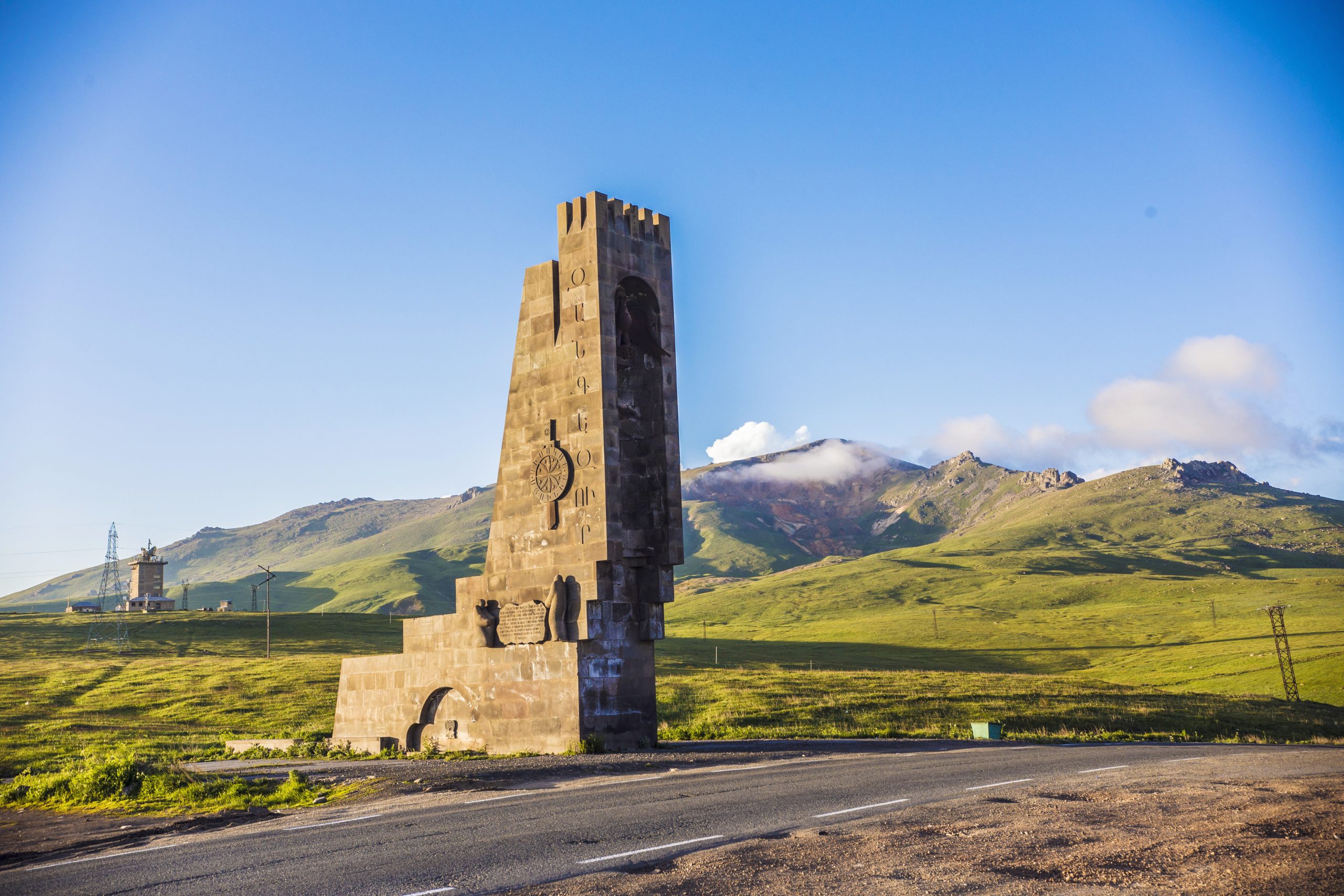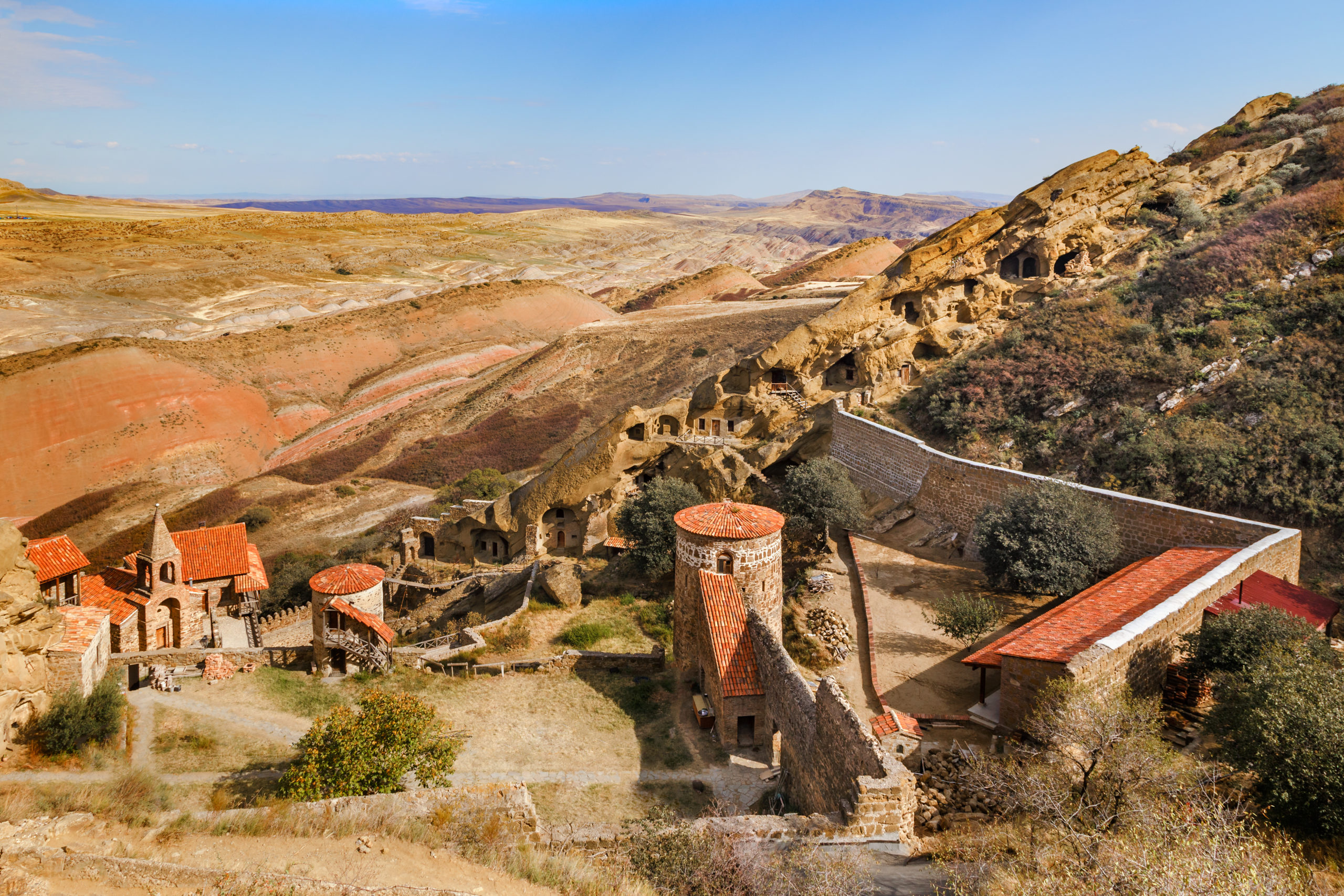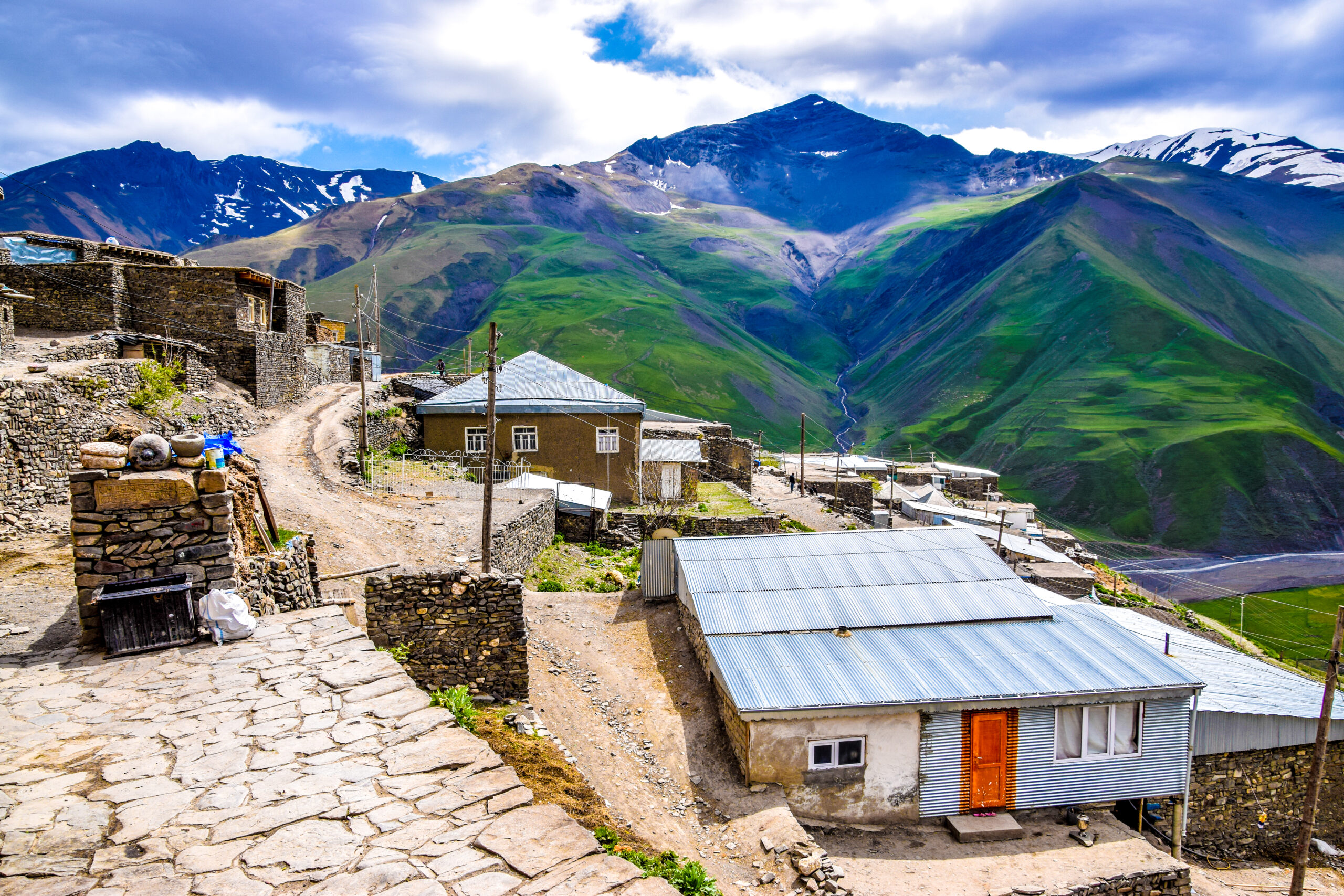Strategic Analysis Caucasus Brief
Review of May 2024
Tomáš Baranec
Armenia

Photo: Shutterstock.com
A local protest in the Tavush region grew into mass anti-government demonstrations in Yerevan
On May 4, a group of people from the village of Kirants, led by Archbishop Bagrat (Srbazan) Galstanyan, leader of the Diocese of Tavush, began a march on Yerevan. They aimed to protest the ongoing process of border delimitation between Armenia and Azerbaijan, as agreed by Armenian Prime Minister Nikol Pashinyan and his Azerbaijani counterparts.
Residents in Kirants have expressed fears that the delimitation process would divide their village between Armenia and Azerbaijan. Based on a preliminary map of the delimited border, several houses, lands, and a recently built school would fall on the Azerbaijani side of the border. Others have raised concerns that a closer border with Azerbaijan would raise risks of Azerbaijani attacks.
What began as a small protest march in the Tavush region steadily picked up supporters along the way before reaching Yerevan. By the time the marchers arrived in the capital on May 9, their numbers had swelled to several thousand. Addressing an estimated crowd of up to 20,000 in Yerevan, Galstanyan accused the prime minister of deceiving citizens about Armenia’s transfer of four villages to Azerbaijan. Pashinyan “lied, misled, and ultimately terrorised and threatened the people. We have come to demand answers for all of this”, Galstanyan said during the Yerevan rally. The cleric went on to demand Pashinyan’s resignation within one hour.
The rally marked the largest public protest in Yerevan since 2018 when Pashinyan himself swept into power amid popular unrest with the previous government. On May 13, civil disobedience commenced in central Yerevan as supporters of the “Tavush in the Name of Motherland” movement obstructed Abovyan Street using garbage cans and street benches. Similar efforts were made to block Myasnikyan Avenue, one of the city’s main thoroughfares, along with other busy roads such as Tigran the Great Avenue, Azatutyan and Komitas avenues, and Tbilisi highway, prompting police interventions and subsequent arrests. Altogether, 200 protesters were detained in the capital by May 17, with opposition representatives accusing the police of using disproportionate force against them.
At the same time, at the end of April 2024, a newly established association of retired senior diplomats critical of the Armenian government voiced “unconditional support” for ongoing protests against Pashinian’s decision to cede several border areas to Azerbaijan.
Armenian Foreign Minister Ararat Mirzoyan criticised diplomats who aligned with the protest movement, branding them „deserters“ and expressing disappointment at their involvement in internal political affairs. Mirzoyan highlighted the efforts to shield the country’s diplomatic corps from domestic conflicts and denounced diplomats’ departures during times of national crisis.
Azerbaijan and Armenia’s border delimitation commissions signed the agreement on April 15, agreeing to delimit the border on the basis of a 1976 Soviet Armed Forces map. The deal affected several key border areas, with control of four abandoned villages and the Kirants bridge being handed over to Azerbaijan. A new section of the road connecting Yerevan with Tbilisi is also expected to be built in two to three months.
Sources:
-
BARDOUKA Yousef, OC Media, Protesters against border delimitation in northeast Armenia march to Yerevan, https://oc-media.org/protesters-against-border-delimitation-in-northeast-armenia-march-to-yerevan/
-
AVETISYAN Ani, OC Media, “Armenia“s opposition condemns border agreement as „illegal“ as protest continues”, https://oc-media.org/armenias-opposition-condemns-border-agreement-as-illegal-as-protest-continues/
-
Eurasianet.org, “Armenia: Protesters call on Pashinyan to leave”, https://eurasianet.org/armenia-protesters-call-on-pashinyan-to-leave
-
Caucasus Watch, “Yerevan Protests Lead to Clashes with Police, Multiple Arrests Reported”, https://caucasuswatch.de/en/news/yerevan-protests-lead-to-clashes-with-police-multiple-arrests-reported.html
-
Azatutyun.am, “Ex-Diplomats Back Protests Against Land Handover To Azerbaijan”, https://www.azatutyun.am/a/32929365.html
Galstanyan suspends priesthood to run for prime minister in Armenia
On May 26, Archbishop Bagrat Galstanyan, the head of the anti-government Tavush for the Motherland movement, announced that he plans to run for prime minister. Galstanyan’s announcement was met with overwhelming support as his movement orchestrated a massive rally in Yerevan’s Republic Square, drawing a crowd of more than 23,000 people.
In a speech, Galstanyan said that he had asked the Armenian Church to „freeze my spiritual service of thirty years“. He added that he suspended his priesthood after talks with Patriarch Karekin II and other members of the clergy, who agreed that he could not run for the position of prime minister as a priest.
On May 27, the Armenian Church announced that Galstanyan’s „episcopal order is preserved, [but] his ecclesiastical and administrative service has been suspended“. However, Galstanyan is constitutionally ineligible to run for office as a dual Armenian-Canadian citizen. In his speech, addressing how he intended to run for prime minister in light of the constitutional hurdle, Galstanyan said that he would „act according to the requirements of the law and by all possible legal means“.
Following the rally, Galstanyan led thousands of demonstrators to the gated residential area where Pashinyan and his family live, demanding a private meeting with the prime minister. It was unclear if Pashinyan, who travelled earlier in the day to northern Armenia to survey historic flood damage, was home then.
Galstanyan then called on his supporters to participate in acts of civil disobedience across Yerevan.
Sources:
-
BARSEGHYAN Arshaluis, OC Media, “Galstanyan suspends priesthood to run for prime minister in Armenia”, https://oc-media.org/galstanyan-suspends-priesthood-to-run-for-prime-minister-in-armenia/
-
Civilnet.am, “Galstanyan, outspoken archbishop, bids to become Armenia“s prime minister”, https://www.civilnet.am/en/news/778453/galstanyan-outspoken-archbishop-bids-to-become-armenias-prime-minister/

Photo: Shutterstock.com
Amid sanctions and a boom in trade, Yerevan is unable to disentangle the economy from Russia
Tax records in Armenia highlight the government’s challenge in trying to disentangle the country’s economy from Russia, reported Eurasianet.org. Trade with sanctions-strapped Russia has proven highly lucrative for many Armenian businesses, which have reportedly adapted to act as middlemen for Russian consumers cut off from direct access to Western goods. No entity seems to have benefited more than Mobile Center, an Armenian mobile phone and electronics retailer linked to local businessman Samvel Aleksanyan. The company’s revenue, allegedly boosted by exports to Russia, was such that it surpassed Armenia’s largest mining company to become the largest taxpayer in Armenia in terms of monetary contribution made to state coffers.
According to the Armenian government’s State Revenue Committee (SRC), the agency collected over 51 million USD (20 billion Armenian AMD) from MobileCenter during the first quarter of 2024, three times higher than the taxes paid by the company during the same period the previous year. Before 2024, the company had not ranked among Armenia’s top taxpaying entities.
The overall total of tax revenue gathered by the state during the first four months of 2024 reached about 846 million USD (330 billion AMD). Mobile Center’s tax payments topped Gazprom Armenia, the Russia-owned national gas distributor in Armenia, and Zangezur Copper and Molybdenum Combine, another company in Armenia with strong Russian ties.
Armenia’s trade turnover with Russia skyrocketed following the invasion of Ukraine, with the country coming under wide suspicion of assisting Russia in sanctions evasion. Armenia’s exports to Russia tripled in 2022 and doubled during the first half of 2023. Last fall, Armenian government officials said Russia accounts for almost 40 per cent of Armenia’s annual exports.
Nevertheless, a rapid growth in Armenia’s exports to Russia, driven in large measure by Western sanctions against Moscow, appears to have slowed down significantly in the fourth quarter of last year.
Full-year data released by the Armenian government’s Statistical Committee shows that they rose by less than 39 per cent to 3.4 billion USD in 2023. This suggests that the lucrative re-exports largely stagnated last fall and December. The recent introduction of a new Russian tax on imports of used and old cars may have been one of the factors behind the slowdown.
Also, the re-exports prompted concern from European and especially US officials in early 2023. They pressed the Armenian authorities to comply with Western sanctions. The authorities introduced mandatory government licenses in May for shipments of microchips, transformers, video cameras, antennas, and other electronic equipment to Russia.
Russian-Armenian trade soared by more than 43 per cent to 7.3 billion USD. It grew steadily even before the war in Ukraine, not least because of Armenia’s accession in 2014 to the Russian-led Eurasian Economic Union. Russia has since replaced the EU as Armenia’s number-one trading partner. According to Armenian government data, Russia accounted for over 35 per cent of the South Caucasus country’s foreign trade last year, compared with the EU’s 13 per cent share.
Sources:
-
Eurasinet.org, “Armenia: Tax records tell a tale of continuing economic dependency on Russia”, https://eurasianet.org/armenia-tax-records-tell-tale-of-continuing-economic-dependency-on-russia
-
Azatutyun.am, “Growth In Armenian Exports To Russia Moderates”, https://www.azatutyun.am/a/32827996.html
Russia and Armenia agree on withdrawal of border guards
The OC Media reported that Russian President Vladimir Putin and Armenian Prime Minister Nikol Pashinyan agreed to withdraw Russian military and border guards from several regions of Armenia at a meeting in Moscow. On May 9, Russian Presidential press secretary Dmitry Peskov told state news agency RIA Novosti that Russian border guards would remain stationed on Armenia’s borders with Iran and Turkey at the Armenian side’s request. Peskov said the decision was made in a one-on-one meeting between Pashinyan and Putin at the Kremlin on May 8.
“In autumn 2020, at the request of the Armenian side, our military and border guards were deployed to several Armenian regions. Pashinyan said that today, there is no longer such a need due to changed conditions. “Hence, President Putin agreed, and the withdrawal of our military and border guards was agreed,” Peskov noted.
Citing another “request of the Armenian side,” Peskov also said that Russian border guards will remain stationed along Armenia’s borders with Turkey and Iran. Initially deployed to Armenia’s southeastern Syunik province during and after the 2020 conflict in Nagorno-Karabakh, these forces were intended to support the Armenian military in defending the strategically significant region against potential Azerbaijani threats. Subsequently, Russian military personnel were stationed in four additional Armenian provinces bordering Azerbaijan, according to the Caucasus Watch.
Sources:
-
SHOSHIASHVILI Tata, OC Media, “Russia and Armenia agree on withdrawal of border guards”,https://oc-media.org/russia-and-armenia-agree-on-withdrawal-of-border-guards/
-
Caucasus Watch, “Russia Withdraws Troops from Armenia“s Border with Azerbaijan at Armenia“s Request”, https://caucasuswatch.de/en/news/russia-withdraws-troops-from-armenias-border-with-azerbaijan-at-armenias-request.html
“Differences” remain as Azerbaijan and Armenia conclude peace talks In Kazakhstan
Armenia and Azerbaijan negotiators continue to disagree on key provisions of a bilateral peace treaty, officials in Yerevan and Baku said on May 11 after the two nations’ foreign ministers ended two days of fresh negotiations in Kazakhstan. “The parties agreed to continue negotiations on open issues where there are still differences,” both ministries said in nearly identical statements. The statements did not specify the differences. Nor did they indicate whether Foreign Minister Ararat Mirzoyan and his Azerbaijani counterpart, Jeyhun Bayramov, had made any progress toward a peace deal.
Nevertheless, both Yerevan and Baku also signalled some positive progress. According to the Azerbaijani side, the ministers welcomed progress on delimitation. They discussed provisions of the draft “Bilateral Agreement on the establishment of peace and interstate relations between Azerbaijan and Armenia.” They agreed to continue negotiations on unresolved issues. The Armenian Ministry of Foreign Affairs also confirmed progress on delimitation and discussions on the bilateral agreement. They agreed to continue talks on unresolved issues.
Mirzoyan said on May 10 that his country is prepared not just for a peace treaty but also to move forward to unblock transport routes. Yerevan and Baku preliminarily agreed in a protocol signed on April 19 on separate sections of the borderline to align it with a Soviet-era border between the respective republics. In it, Armenia ceded control of four villages controlled by Yerevan since the 1990s. The deal has been staunchly opposed by an outspoken Armenian archbishop who has attracted tens of thousands of demonstrators in Yerevan with calls for Prime Minister Nikol Pashinian’s resignation and a civil disobedience campaign.
Sources:
- RFERL.org, “„Differences“ Remain As Azerbaijan, Armenia Conclude Peace Talks In Kazakhstan”, https://www.rferl.org/a/armenia-azerbaijan-peace-talks-kazakhstan-protests/32942085.html
- Caucasus Watch, „Azerbaijan and Armenia Advance Delimitation Talks in Almaty”, https://caucasuswatch.de/en/news/azerbaijan-and-armenia-advance-delimitation-talks-in-almaty.html
Armenia launches housing program for displaced Nagorno-Karabakh families
The Armenian government approved the housing provision program for forcibly displaced persons from former de facto Nagorno Karabakh after Minister of Labor and Social Affairs Narek Mkrtchyan presented the relevant project, reported Armenpress.am.
Presenting the project, the minister noted that it has three components. “The first option involves getting a certificate to buy an apartment or a house. The second option is getting a certificate to build a house. The third option is receiving support to pay off an existing mortgage loan,” Mkrtchyan said.
The certificates vary depending on the number of family members and the location. “For instance, families can receive up to 5 million AMD for projects in 242 urban and rural areas, up to 4 million AMD in 148 other areas, and 3 million AMD in remaining areas, excluding specific zones in Yerevan. Additionally, those with existing mortgage loans can receive 2 million AMD, except for properties in certain zones of Yerevan”, noted Mkrtchyan.
“After September 27, 2020, a family forcibly displaced from Nagorno-Karabakh is considered a beneficiary if all family members, including minors, have or have received the citizenship of the Republic of Armenia. The area of the house to be purchased should not be less than 12 square meters per family member, the price of the house to be purchased cannot exceed 55 million AMD,” Mkrtchyan said.
Source:
- Armenpress.am, “Government approves housing provision program for Nagorno-Karabakh displaced people”, https://armenpress.am/eng/news/1137191/
Azerbaijan, Kazakhstan and Uzbekistan press ahead with ambitious electricity export plan
As reported by Eurasianet.org, the energy ministers of the three countries announced the signing of a memorandum of understanding in early May to explore their joint electricity export potential by harnessing mainly wind and solar power.
Kazakhstan is also aiming to boost its hydropower generating capacity. In outlining cooperation plans, the tripartite memo envisions laying a “high-voltage cable” on the Caspian Sea’s seabed. Technical specifications for such a transmission line have already been developed, according to Kazakh Energy Minister Almassadam Satkaliyev. “A proposed business model will be developed for the development of international transmission corridors (financing, revenue flow and ownership) and the sale of green energy to the countries of the European Union,” a ministry statement quoted Satkaliyev as saying.
The three countries have wasted little time in pursuing the plan. Satkaliiev said on May 10 that a feasibility study was underway. He told journalists that the EU had given the budding consortium an expression of “interest in purchasing clean electricity.” The feasibility study will work out construction and financing details and is expected to produce preliminary estimates by the end of the year. It is too early to put a price tag on the project or the amount of power exports involved. “We are talking about a fairly large amount of investment,” Satkaliyev said.
The goal of exporting electricity to the EU fits with plans unveiled by all three countries to significantly expand renewable energy generating capacity in the coming years. The chief catalyst for power exports is Uzbekistan, which aims to generate an additional 20 Gigawatts (GW) via renewable sources by 2030. Meeting that target would raise the country’s total renewable capacity to 27 GW. By April, the government had signed deals to develop wind and solar facilities projected to produce 12 GWs. In May, Uzbekistan entered into contracts for another 6 GW.
Kazakhstan and Azerbaijan seem destined to play more of a facilitating role in the power export arrangement. Given its abundance of fossil fuels, Astana’s renewable goals seem more modest than Uzbekistan’s. Kazakhstan currently generates about 2.9 GW of power via renewable sources and hopes to add at least another 5 GW by 2030, according to Satkaliyev. However, much of that capacity may be needed at home as Kazakhstan grapples with a power deficit that saw the country become a net importer of electricity in 2023.
Azerbaijan aims to generate 5 GW of solar and wind power by 2030. The MoU Baku entered into with Kazakhstan and Uzbekistan potentially builds on a 2023 agreement that Azerbaijan concluded with EU states, including Hungary and Romania, to export power via an underwater cable traversing the Black Sea with a capacity of 1,000 Megawatts. The feasibility study for the Black Sea project was conducted before Russia’s unprovoked invasion of Ukraine in 2022, thus raising questions about its viability under wartime conditions.
As reported, the first meeting in this format took place on November 14, 2023, in Baku. The final communique included issues relating to power exchange with a focus on renewable sources, development and export of green hydrogen and ammonia, cooperation in the construction of necessary infrastructure, and other matters of mutual interest. According to the document, the three countries agreed to create a joint venture to export electricity and to conduct a feasibility study for the project. Other countries of the region will be able to join the project in the future.
Sources:
-
Eurasianet.org, „Azerbaijan, Kazakhstan and Uzbekistan press ahead with ambitious electricity export plan”, https://eurasianet.org/azerbaijan-kazakhstan-and-uzbekistan-press-ahead-with-ambitious-electricity-export-plan
-
Interfax.com, “Azerbaijan, Uzbekistan and Kazakhstan discuss electricity supply from Central Asia to Europe through Azerbaijan”, https://interfax.com/newsroom/top-stories/101911/
France accuses Azerbaijan of supporting riots in New Caledonia
France has accused Azerbaijan of supporting rioters against French rule in New Caledonia, a French territory in the South Pacific. The Guardian quoted French Interior Minister Gerald Darmanin as saying this was “a reality”. “I regret that some Caledonian pro-independence leaders have made a deal with Azerbaijan. It’s indisputable”, Darmanin said.
Azerbaijani media reported that the Baku Initiative Group (BIG) had organised a video conference attended by representatives of “movements fighting for independence” in New Caledonia, French Polynesia, French Guiana, Martinique, Guadeloupe, and Corsica, all French overseas territories and dependencies, in solidarity with indigenous people in New Caledonia. The attendees later issued a joint statement condemning French rule and advocating for the territories“ independence.
The Baku Initiative Group was officially established on July 6 2023, by participants of a conference “Towards the complete elimination of colonialism” held in Baku. The group’s stated aim was to support groups fighting for freedom from colonialism.
Meanwhile, Aykhan Hajizada, the Azerbaijani Ministry of Foreign Affairs Spokesperson, issued a firm rejection. In a statement, Hajizada condemned the French side’s “insulting expressions against Azerbaijan.” The statement urged France to cease its “smear campaign against Azerbaijan” and refrain from making unacceptable accusations, such as the reference to the massacre of Armenians. Instead, it suggested that the French Minister of the Interior should reflect on his country’s history of committing crimes against humanity towards local peoples and the brutal murder of millions of innocent individuals as part of its colonial policies over many years.
As Caucasus Watch reminded, in the past few days, New Caledonia, a particular administrative-territorial entity of France in the South Pacific, has been engulfed in unrest and clashes between supporters and opponents of independence. The protests reportedly erupted in response to a bill that would have extended voting rights to French residents of New Caledonia.
Sources:
-
FARHADOVA Aytan, OC Media, “France accuses Azerbaijan of supporting riots in New Caledonia”, https://oc-media.org/france-accuses-azerbaijan-of-supporting-riots-in-new-caledonia/
-
Caucasus Watch, “French Interior Minister Accuses Azerbaijan of Interference in New Caledonia Politics”, https://caucasuswatch.de/en/news/french-interior-minister-accuses-azerbaijan-of-interference-in-new-caledonia-politics.html

Photo: Shutterstock.com
US congressperson accused of accepting 360,000 USD in Azerbaijani bribes
Henry Cuellar, an influential South Texas Democrat, was indicted with his wife Imelda on charges of accepting almost 600,000 USD in bribes from Azerbaijan and a Mexican commercial bank, Banco Azteca.
According to the indictment, the Cuellars were allegedly setting up a scheme to accept payments from Azerbaijan’s state-run oil and gas company, which were also laundered through fake consulting contracts to shell companies owned by Imelda Cuellar. In exchange, Henry Cuellar allegedly pushed US policy that favoured Azerbaijan.
It included adding language to defence spending legislation to prioritise ties to countries in the region, including Azerbaijan, and working to kill legislation prioritised by members who supported Armenian interests, the indictment alleges. Prosecutors say that Henry and Imelda Cuellar crafted two years-long schemes to get bribes from foreign entities – an oil and gas company “wholly owned and controlled by the Government of Azerbaijan, and a bank headquartered in Mexico City.”
In exchange for bribe payments from the Azerbaijan oil company, Cuellar “agreed to perform official acts in his capacity as a Member of Congress, to commit acts in violation of his official duties, and to act as an agent of the Government of Azerbaijan” and the bank, the indictment says.
A spokesperson for House Minority Leader Hakeem Jeffries released a statement
shortly after Cuellar’s charges were reported, saying that the congressman is entitled to the presumption of innocence. But, spokesperson Christie Stephenson said, Cuellar will temporarily step down from his top spot on a House Appropriations Subcommittee while the investigation is ongoing.
Sources:
-
SCHERER Jasper, Texas Tribune, “Two political consultants plead guilty in Henry Cuellar bribery case”, https://www.texastribune.org/2024/05/09/henry-cuellar-political-consultants-plea-deal-guilty/
-
TALBOT Haley, RABINOWITZ Hannah, CNN, „Rep. Henry Cuellar and his wife allegedly took nearly $600,000 in bribes, the indictment says”, https://edition.cnn.com/2024/05/03/politics/henry-cuellar-indictment-doj/index.html
Azerbaijan and Slovakia sign Strategic partnership and defence agreements
During the official visit of Slovak Prime Minister Robert Fico to Azerbaijan, important agreements on military cooperation were signed, informed Turan.az. During the ceremony, President Aliyev and Prime Minister Fico signed a “Joint Declaration on the Establishment of Strategic Partnership between the Republic of Azerbaijan and the Slovak Republic”, marking a significant step forward in bilateral relations.
In addition, two important agreements were signed in the field of defence. Vugar Mustafayev, Minister of Defense Industry of the Republic of Azerbaijan, and Robert Kaliňák, Deputy Prime Minister and Minister of Defense of the Slovak Republic, signed a “Memorandum of Understanding between the Ministry of Defense Industry of the Republic of Azerbaijan and the Ministry of Defense of the Slovak Republic in the field of military-technical cooperation”.
In addition, Zakir Hasanov, Minister of Defense of the Republic of Azerbaijan, together with Deputy Prime Minister Kaliňák signed an “Agreement between the Ministry of Defense of the Republic of Azerbaijan and the Ministry of Defense of the Slovak Republic on Defense Cooperation”. These agreements are indicative of the growing strategic and defence cooperation between Azerbaijan and Slovakia.
Agreements also emphasise mutual interest in strengthening ties in various military fields, including military-technical and military-educational cooperation. The signing took place after the previous meeting on January 8, 2024, at which both sides stressed the importance of these joint efforts.
Sources:
-
Turan.az, “Azerbaijan and Slovakia signed key agreements on military cooperation during the visit of Prime Minister Fico”, https://turan.az/en/economics/azerbaijan-and-slovakia-signed-key-agreements-on-military-cooperation-during-the-visit-of-prime-minister-fico-780262
-
Caucasus Watch, “Azerbaijan and Slovakia Sign Strategic Partnership and Defense Agreements”, https://caucasuswatch.de/en/news/azerbaijan-and-slovakia-sign-strategic-partnership-and-defense-agreements.html
President Zurabishvili outlines plan for temporary government following elections
As reported by the OC Media, Georgian President Salome Zurabishvili has invited opposition parties to sign a “Georgian Charter” pledging to support the President’s nominations for a new, temporary government after the elections with the stated aim of carrying out pro-European reforms.
At an announcement outside the Orbeliani Palace marking Independence Day, Zourabichvili said she would choose a government of „distinguished, selected, and professional members of society“ rather than politicians. The President said the new government, to be formed after upcoming elections, would be „tasked with implementing a specific European plan“, after which new elections would be held in a „new, free environment“ in late 2025.
She said the Charter did not entail a joint opposition electoral list. „Political parties should determine their own election tactics and strategies once they have signed the Charter — that matter is not mine“, she said.
The President also stressed that autumn’s election would be a referendum on the country’s EU membership. „In these elections, we have to decide not who we vote for, but what we vote for! That is why these elections will, in reality, be a referendum where we have to answer the following question: do we want Europe or not? And when we vote for any under-signatory party of this Charter, we are, in fact, voting for the “Georgian Charter” and, therefore, for a European future“, she said.
In addition to a promise to support the President’s choice of temporary government, the Charter included a number of pledged reforms to be carried out before new elections would be held.
Signatories would promise to immediately repeal legislation passed by the ruling party that „contradict [Georgia’s] European path and European recommendations“. These included the foreign agent law, the offshore law, and more. The Charter also promised an amnesty for protesters against the foreign agent law. It laid out a series of sweeping judicial reforms. Both local and international government critics have accused the ruling party of capturing the judiciary, supporting an influential „clan“ of judges who rule on politically sensitive cases. It promises a „fundamental reform“ of the State Security Service and Ministry of Internal Affairs „to deconcentrate the power“.
„Effective parliamentary control will be established over the activities of each institution, which will protect them from political influence“, the Charter reads. The Charter also vows to strengthen and make more independent the Special Investigation Service, which investigates police abuses, and the Anti-corruption Bureau.
The Charter vows to restore independence to the National Bank. Georgia’s central bank saw practically its entire upper management quit last year after new regulations were introduced to shield Georgian citizens from international sanctions. The new government would also be tasked with creating “appropriate conditions [to] hold free and fair elections“.
Following Georgian President Salome Zurabishvili’s announcement of the “Georgian Charter” on May 26 nine opposition parties have so far pledged to sign it. These parties are: Girchi-More Freedom and Droa, United National Movement and Strategy Aghmashenebeli, Ahali, Lelo for Georgia, European Georgia, Republican Party, and Citizens. According to Civil.ge, the President has set June 1 as the deadline for signing these provisions and joining the Charter.
Georgian Dream’s parliamentary leader, Mamuka Mdinaradze, attacked the initiative on Sunday night. IPN cited him as saying it was not a “Georgian Charter” but a “charter of local war”. According to PM Irakli Kobakhidze, it is a pity that May 26, which is the National Independence Day, was used for political statements. “I don’t want to comment on the statements. It is a pity when May 26, which is the day of national independence, is used for political statements, it is not a day of political statements, it is a national holiday where we should all talk together, not about politics in a narrow sense, but about our common national task,” said Kobakhidze.
Sources:
-
FABBRO Robin, OC Media, “President Zourabichvili outlines plan for the temporary government following elections”, https://oc-media.org/president-zourabichvili-announces-plan-for-temporary-government-following-elections/
-
Civil.ge, News, “Opposition Parties to Sign Georgian Charter Initiated by President”, https://civil.ge/archives/609511
-
Interpressnews.ge, “Irakli Kobakhidze: It is a pity when May 26, which is the day of national independence, is used for political statements”, https://www.interpressnews.ge/en/article/131782-irakli-kobakhidze-it-is-a-pity-when-may-26-which-is-the-day-of-national-independence-is-used-for-political-statements
China wins bid to build Georgia’s new Black Sea container port in Anaklia
The government of Georgia has awarded a 49 per cent stake in the future Black Sea port of Anaklia to a Chinese consortium led by the state-owned China Communications Construction Company (CCCC).
The project will have a container throughput of 600,000 TEU annually, supporting a long-planned “Middle Corridor” of multimodal transport connecting China to Europe. According to RFE/RL, this move by the Georgian government could further strain relations with the West. “The decision to make this announcement the day after the ‘foreign agent’ vote doesn’t look to be an accident,” Tinatin Khidasheli, the Georgian ex-defence minister from 2015-16, told RFE/RL. “It’s been an open secret that the government has wanted to award this to the Chinese, but this choice of companies is very concerning, and the timing sends something of a message.”
The companies involved in the new port deal are all state-owned Chinese firms. While they have extensive global experience, they’ve also courted international controversy and scandal, from fraud accusations in the Philippines to bribery in Bangladesh. Two companies in the consortium have also been banned from participating in World Bank-financed construction projects.
The selection of Chinese companies with a track record of corruption accusations could further inflame the country’s ties with the West and reshape the so-called Middle Corridor. This global trade network ships goods between Europe and Asia, and Georgia serves as a strategic node.
“Anaklia is the crown jewel of the Middle Corridor,” Romana Vlahutin, a distinguished fellow at the German Marshall Fund and former European Union ambassador-at-large for connectivity, told RFE/RL. “If you have China building such a key point, then you are giving them the capacity and opportunity to control a vital route for trade between Europe and Asia.”
Georgian Prime Minister Irakli Kobakhidze expressed optimism about the Anaklia port project, stating that its successful implementation in the country’s north-west would “significantly contribute” to domestic economic growth, potentially opening up new avenues for trade and investment.
Speaking at the weekly Government meeting, Kobakhidze said a joint company would be established for the project, with a state company holding a 51 per cent share in the initiative and a foreign consortium holding a 49 per cent share.
Nika Parulava from Akhali, on the other hand, believes that the given decision “will be an additional factor for further escalation of relations with the United States of America and distancing from the Georgian Dream…”
Sources:
-
The Maritime Executive, “China Wins Bid to Build Georgia’s New Black Sea Container Port”, https://maritime-executive.com/article/china-wins-bid-to-build-georgia-s-controversial-black-sea-port
-
Agenda.ge, “Georgian PM: Anaklia port project will make “significant contribution” to economic growth”, https://agenda.ge/en/news/2024/39392#gsc.tab=0
-
Civil.ge, “Domestic Reactions to Granting of Anaklia Port to Chinese Consortium”, https://civil.ge/archives/610451

Photo: Shutterstock.com
Georgian Dream overturns President’s veto of the foreign agent law
On May 28, MPs from Georgia’s ruling Georgian Dream party overturned the President’s veto of the controversial foreign agent bill, passing it into law. At a plenary session of the Parliament, 84 MPs voted in favour of adopting the law unchanged. It will come into force in 60 days.
After the law passed, Speaker of the Parliament Shalva Papuashvili hailed his party for making an “important decision”. “No other people, no other country, no other power determines the life of our state and our people, and that’s exactly what this law is about”, he said.
Demonstrators gathered in front and behind the Parliament building from early morning hours as the ruling party prepared to overturn the presidential veto. Deliberations on the law were accompanied by loud chants from the crowd outside, calling on Georgian Dream MPs not to change Georgia’s foreign policy course by adopting a law that has been highly criticised by international partners.
The final adoption of the law follows almost two months of protests, during which protest leaders and government critics have faced police brutality and a spate of planned attacks near their homes by masked men. Several criminal cases and dozens of hefty fines were also filed against others.
Source:
-
OC Media, “Georgian Dream overturns veto of foreign agent law”, https://oc-media.org/georgian-dream-overturns-veto-of-foreign-agent-law/
-
Civil.ge, “Photo Story | Veto on Agents’ Law Overturned, Against the Backdrop of Mass Protests”, https://civil.ge/archives/610187
Georgia’s Parliament passes controversial electoral code amendments
As the OC Media explained, the CEC has 17 members — eight nominally non-partisan and the other nine representing political groups, including the ruling Georgian Dream party. The amendment will effectively allow the CEC to make rulings with nine votes instead of 12, effectively without the support of its eight members who represent opposition groups.
Eight opposition representatives of the CEC are currently from the United National Movement, Strategy Aghmashenebeli, Girchi — New Political Centre, European Georgia, European Socialists, Citizens, and European Democrats parties.
While formally an opposition party founded after the 2020 parliamentary elections in a split from the Alliance of Patriots, the European Socialists are considered to be Georgian Dream allies as they have consistently supported the legal initiatives of the parliamentary majority, writes OC Media.
Sources:
-
KINCHA Shota, OC Media, “Georgia’s parliament passes controversial electoral code amendments”, https://oc-media.org/georgias-parliament-passes-controversial-electoral-code-amendments/
Georgia: Market reaction shows „foreign agents“ law is bad for business
Shockwaves have roiled Georgia’s economy since Parliament adopted the law on May 14. Leaders of government-connected firms are supporting the legislation, but many small- and medium-sized business owners are siding with opponents of the measure, writes Eurasianet.org.
A statement issued in April by the Business Association of Georgia, an organisation uniting mostly large enterprises, adhered to government claims that the “foreign agents” law would boost transparency and thus would not derail Georgia’s EU membership bid. On May 13, another, smaller group of entrepreneurs, Women for Tomorrow, reaffirmed a statement from last year opposing the law, asserting that it threatens the “interests of the country.”
On May 15, the day after the bill passed its third and final reading, the exchange rate for the Georgian GEL plunged against the US dollar, then rose slightly the following day after the National Bank of Georgia intervened to stabilise the currency, announcing that it had sold 60 million USD worth of the country’s reserves.
Meanwhile, the prices of shares of Georgian companies listed on the London Stock Exchange fell significantly. While prices of large companies often fluctuate, the sharp drop was seen by some experts as a direct result of adopting the highly controversial Foreign Agents Law, which might trigger sanctions from the West.
Within hours of trading on May 15, as of 15:00 Tbilisi time, Bank of Georgia shares plunged about 15 per cent. Shares of Georgia Capital fell by around 9 per cent, and shares of TBC Bank saw a 12 per cent drop.
Sources:
- BENSON Brawley, Eurasianet.org, Georgia: Market reaction shows „foreign agents“ law is bad for business, https://eurasianet.org/georgia-market-reaction-shows-foreign-agents-law-is-bad-for-business
- Civil.ge, “Georgian Companies“ Shares Drop on London Stock Exchange After Adoption of Agents Law”, https://civil.ge/archives/607329
Georgian Orthodox Church marks Family Purity Day
On May 17, the Georgian Orthodox Church celebrated the Day of “Family Purity and Respect for Parents” with gatherings across Georgia, including in the capital Tbilisi. The celebration commenced at Kashveti Church on Rustaveli Avenue, continuing in a procession to the Holy Trinity Church, the city’s main cathedral.
Key figures from the ruling Georgian Dream party, including Prime Minister Irakli Kobakhidze and Parliament Speaker Shalva Papuashvili, as well as Tbilisi Mayor Kakha Kaladze, joined the march, underscoring the government’s support. Meanwhile, on May 15, the government officially declared the day a national holiday and an official day off in 2024.
Family Purity Day was established by Georgia’s conservative Orthodox Church in 2014 in response to the International Day Against Homophobia, Biphobia, and Transphobia (IDAHOBIT), which is marked every year on May 17 to raise awareness of LGBT rights violations around the world. To avoid confrontation, no rallies against the “foreign agent” law were scheduled during the march for Family Purity Day.
Sources:
- Civi.ge, “March for Family Purity and Respect for Parents”, https://civil.ge/archives/607882
- AP, “Georgia“s prime minister joins tens of thousands in a march to promote „family purity“”, https://apnews.com/article/georgia-family-purity-day-lgbtq-rights-cda83d6f050eff2defdc7c0565044a48
- RFERL, “Events Marking „Family Purity Day“ In Georgia Contrast Sharply With „Foreign Agent“ Protests”, https://www.rferl.org/a/foreign-agent-tbilisi-familiy-purity-lgbt-idahobit/32951237.html
Venice Commission advises Georgia to scrap „foreign influence“ law
On May 21, the Venice Commission issued an urgent opinion on the Foreign Agents Law in which it “strongly recommends” that the law “be repealed in its current form”, stating that “its fundamental flaws will involve significant negative consequences for the freedoms of association and expression, the right to privacy, the right to participate in public affairs as well as the prohibition of discrimination.” The Venice Commission says that the law “will affect open, informed public debate, pluralism and democracy.”
The Commission regrets that the Parliament adopted the highly controversial law in disregard of the concerns of large sections of the Georgian population and said: “This manner of proceeding does not meet the European requirements of democratic law-making.”
The Venice Commission also strongly criticised the government’s adoption of the law, stating that it „left no space for genuine discussion and meaningful consultation, in open disregard for the concerns of large parts of the Georgian people.““This manner of proceeding does not meet the European requirements of democratic law-making,” it added.
Sources:
- Euronews.com, “Venice Commission advises Georgia to scrap ‘foreign influence’ law”, https://www.euronews.com/2024/05/22/georgia-should-scrap-foreign-influence-law-council-of-europe
- Civil.ge, „Venice Commission Strongly Recommends Repeal of Foreign Agents Law”, https://civil.ge/archives/608557



Contact us